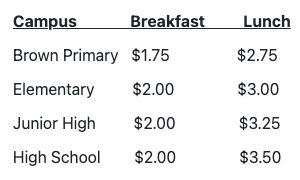Budgetary Constraints End Free Breakfasts in Smithville Schools
After more than two decades of offering free breakfast to all students, Smithville ISD will begin charging for morning meals starting this school year, a decision driven by mounting financial pressures on the district's child nutrition program.

By Kristen Meriwether, Publisher
After more than two decades of offering free breakfast to all students, Smithville ISD will begin charging for morning meals starting this school year, a decision driven by mounting financial pressures on the district's child nutrition program.
The change, approved unanimously by the school board at Monday's meeting, marks unfamiliar territory for the district, which has prided itself on covering breakfast costs through a combination of federal reimbursements, grants, and revenue from free and reduced-price meals.
But with rising food, labor, and utility expenses outpacing funding, Director of Food Services Candy Biehle had tough choices to make. She spent months digging into every line of the budget, reviewing four to five years of food, labor, and equipment costs. She considered national programs, explored eligibility options, pursued grants, and increased the use of USDA commodities like fresh fruits and vegetables.
When the math still didn’t work, she made the tough call to propose charging for breakfast and raising lunch prices by 25 cents at each campus to avoid further dipping into the general fund or requiring a tax increase.
“This is very unfamiliar territory for me,” Biehle told the board. “In the 30 years that I've been a child nutrition director, I have never come to a board with this type of information.”

Biehle, who has led the department with a focus on nutritious, appealing meals, outlined a series of challenges that have eroded the cafeteria fund's balance. Food costs have risen 7% in the past year, labor expenses are up 12%, and utilities have increased by over $10,000 annually. Unlike surrounding districts, where nutrition programs often run deficits covered by general funds, Smithville’s has historically shouldered its own expenses.
That includes paying their own electric bills, which now total $45,000 to $50,000 each year. That self-sufficiency dates back to a time when the fund had a surplus, but now it's “coming back to kick me in the butt,” Biehle said candidly.
Adding to the strain: federal reimbursement rates haven't kept pace with costs, grant funding has dwindled, and equipment repairs for aging appliances have totaled $15,000 to $25,000 recently. Last school year alone required a $110,000 investment for a new walk-in cooler.
Participation in the free and reduced-price lunch program, which brings in higher reimbursements, has also declined unexpectedly, particularly at the elementary level. Biehle attempted to qualify the district for a federal program, but falling numbers of directly certified students (those automatically eligible through programs like SNAP) meant they didn't meet the threshold. With anticipated federal cuts to SNAP benefits, she doesn't expect improvement soon.
In the past, revenue from free and reduced-price meals subsidized breakfast for everyone else. But with rising costs, the numbers no longer add up.

Recent efforts to reverse the trends, like securing a grant for higher-quality foods to entice more students, yielded mixed results: lunch participation rose, but breakfast dipped, and paid meal counts didn't climb as hoped. Shorter school calendars in the last two years have meant fewer serving days and less revenue. Raises intended to offset those calendar changes have further burdened the department's budget.
“I'll be real honest with you, every time there's an increase, and raises are given, I'm thrilled. Everyone should get a cost of living. Everyone should get a raise,” Biehle said. “This is great, but it's not great for my department. It's not great for my budget. We've got to figure out how to cover these raises.”
Despite the hurdles, Biehle emphasized her team's commitment to quality without shortcuts.
“The child nutrition program is committed to providing nutritious and appealing meals that meet the guidelines, while attempting to maintain financial responsibility,” she said.
To meet those goals, she proposed charging for breakfasts at each campus and increasing the lunch price by $0.25 at every campus. (The elementary school saw a similar lunch increase last year.) Based on current trends and a conservative forecast of 50% breakfast participation, the changes could generate about $17,500 from lunches and $38,900 from breakfasts.

To cut costs internally, Biehle is reducing staff by not filling one office position and not filling three to four kitchen roles.
“I don't think, I know we don't have a choice, and that's what I expressed to them,” she said. “We don't have a choice.”
Office staff, including Biehle herself, will step in as substitutes when needed, and workers will only be scheduled on days students are on campus to align with revenue.
The decrease in days could drive staff to Bastrop schools, where their kitchen staff make more than managers in Smithville ISD.
Board Member Josh Magden asked what would happen if she lost more staff.
“It is a concern of mine, and that's why I have hesitated to do this for years,” Biehle said. “We will be in a crisis mode, but again, that's where myself and my office staff will jump in, and we will wear our burnout shoes, and we'll be in that kitchen.”
Biehle stressed no child would go hungry, even as habits shift from free meals.
“I'm all about feeding the child,” Biehle said. “As a child, put it one time, ‘if I eat in the cafeteria, I can hear the teacher, because I don't hear my stomach louder than the teacher.’ So I'm all about academics and nutrition together.”
Biehle, who has spent 30 years in child nutrition, is concerned by the challenges, but has chosen to embrace the moment as an opportunity.
“I've thought, why did I not retire at the end of the year like others,” she said. “Then I decided that, no, I like a challenge. This is a challenge, and I really feel that I'm going to take every step I can to bring this in another direction, because this is something I've never experienced before, and I do want to see something change before I do leave. So I'd like to see it go in a positive manner.”




Comments ()